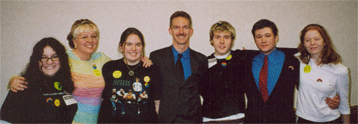ACLU Wins Settlement for Kentucky School's Gay-Straight Alliance
District Will Allow Club to Meet and Will Provide Anti-Harassment Training for Students and Staff
FOR IMMEDIATE RELEASE
ASHLAND, KY - The American Civil Liberties Union today announced the end of a year-long lawsuit it brought on behalf of several students who had sought to form a gay-straight alliance (GSA) club at Boyd County High School. The settlement requires that the district treat all student clubs equally and conduct an anti-harassment training for all district staff as well as all students in high school and middle school.
"The Boyd County Public Schools wasted over a year's time and a lot of taxpayer money to try to stop these students from having their club, when a federal judge had already made it clear that the district was breaking the law by trying to silence students who wanted nothing more than a place to talk about how to stop anti-gay harassment and discrimination at school and in the community," said Tamara Lange, an attorney with the ACLU's Lesbian and Gay Rights Project who represented the GSA. "This should serve as a reminder to schools everywhere that they can't tinker around with federal law in an attempt to pick and choose which clubs they want to allow to exist."
In December 2002, the Boyd County Board of Education took the extraordinary step of suspending all clubs in all schools in the district - kindergarten through 12th grade - in an effort to prevent a group of students from forming a GSA at Boyd County High School. Local ministers had organized school walkouts and a public rally to voice their opposition to the GSA, and school officials claimed that disruption at the school by people objecting to the GSA justified suspending the club.
Last April, a federal judge issued an injunction ordering that the GSA be allowed to meet and noting that schools cannot silence students who hold unpopular views just because other students or community members protest against them.
"This club has never been about anything but making a safe space for students who are harassed on a daily basis in our school," said Kaye King, faculty adviser to the GSA. "We're glad the school finally understands that and is taking steps to address the harassment in our district on a wider scale."
In hearings leading up to the injunction, testimony from members of the GSA had painted a grim picture of a school where harassment is rampant. For example, students in an English class once stated that they needed to "take all the fucking faggots out in the back woods and kill them."
"Schools have to understand that allowing students to form gay-straight alliances like the one at Boyd County High School is not only what they're required to do by law, but is also something they should be encouraging," said Beth Wilson, Executive Director of the ACLU of Kentucky. "Gay-straight alliances work to foster tolerance and make students who have traditionally been marginalized feel safe and valued. Schools not only shouldn't discriminate against GSAs - they should be encouraging them to form."
Under the terms of the settlement agreement, the district agreed to:
- Treat the gay-straight alliance no differently from other clubs
- Conduct an annual training session on all types of harassment (including a special component on anti-gay harassment)
- Revise all student activities policies to treat members of all clubs equally.
The plaintiffs did not ask for monetary damages.
The students had first petitioned the school to form the gay-straight alliance in March 2002. The school's Site Based Decision Making Council approved the GSA in October 2002 after the ACLU sent a letter explaining the students' rights under the federal Equal Access Act but the Board of Education, bowing to opposition from local ministers, reversed the council's decision that December and suspended all clubs. The ACLU filed a lawsuit against the district last January.
The lawsuit was heard in Ashland by the United States District Court of the Eastern District of Kentucky. The ACLU is represented by Tamara Lange and James Esseks, ACLU of Kentucky general counsel David Friedman, and ACLU cooperating attorney Ed Dove.
Stay Informed
Sign up to be the first to hear about how to take action.




